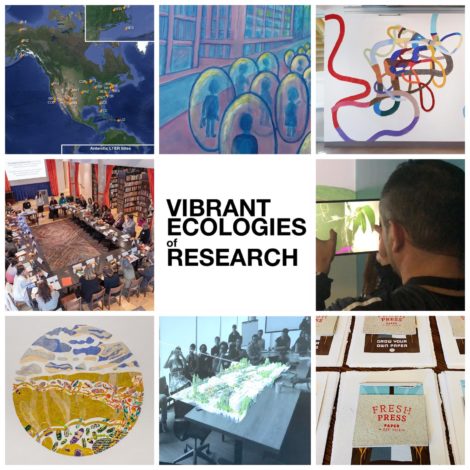a2ru Ground Works Special Issue “Vibrant Ecologies of Research” Wins Award from Council of Editors of Learned Journals

Jan 10, 2023
Ground Works, a2ru’s online peer-reviewed journal highlighting interdisciplinary, arts-inclusive research, has been honored by the Council of Editors of Learned Journals (CELJ) with its 2022 “Best Special Issue” award for “Vibrant Ecologies of Research.” This special issue explores the ecologies where arts-based inquiry thrives in conversation with social and scientific research. Aaron D. Knochel, Associate Professor of Art Education at Penn State University, served as Guest Editor for the issue; Veronica Stanich, a2ru’s Research Program Manager, is the managing editor of Ground Works. CELJ announced their annual awards at the 2023 Modern Language Association (MLA) conference in San Francisco.
In its award citation, the CELJ award review committee called “Vibrant Ecologies of Research” “remarkable among a strong field of contenders.” They continued: “This special issue makes clear the importance of providing a generative space for work that does not fit in traditional disciplinary journals or galleries. The overall thematic concept and the ways in which it was presented was innovative and insightful…The committee was particularly taken with the interactive and dynamic aspects of the special issue, creative use of visual artifacts, and strong collection of individual articles and commentary.”
This is the second time in two years that Ground Works has been recognized by CELJ; it was awarded an Honorable Mention for its “Best New Journal” prize of 2021.
Guest Editor Aaron Knochel responded to the award, saying: “It is very gratifying to have this recognition from the CELJ both for the hard work of the authors and the vision of the editorial team and board that is a2ru Ground Works. We’re trying to push academic publishing into new spaces to address the complex challenges we all face. I’m proud that the collection may show some pathways to generate possibility, but of course the work goes on.”
Managing Editor Veronica Stanich adds: “The people at CELJ and the publications they represent are so smart and inspiring. I’m immensely proud to be recognized by this organization, and to be in such esteemed company. Aaron’s guiding question for this issue about the institutional ecologies that support (or don’t) transdisciplinary, arts-centered research is such an important one. I hope ‘Vibrant Ecologies’ is on the reading list not only for people doing this type of research but for anyone interested in complex problems like the UN’s Sustainable Development Goals.”
“Vibrant Ecologies of Research” presents the work of scholars and artists representing dozens of leading institutions and organizations. The five peer-reviewed projects included in the issue are:
- “ASKXXII: Ecologies of Interdisciplinary Research and Practice in Art+Science and Technology” by Genevieve G. Tremblay (Coastal Social-Ecological Millennium Institute SECOS), Jeff Brice (Kentucky College of Fine Art and Design), Fernanda Dunlop (Instituto Milenio en Socio-Ecología Costera SECOS), Nelida Pohl (Instituto de Ecologia y Biodiversidad), and Belen Gallardo
- “Fresh Press Agri-Fiber Paper Lab” by Eric Benson (University of Illinois at Urbana-Champaign)
- “In a Time of Change: A Nested Ecosystem of Environmental Arts, Humanities and Science Collaboration” by Mary Beth Leigh (University of Alaska Fairbanks) and Lissy Goralnik (Michigan State University)
- “Just-in-Time Ecology of Interdisciplinarity: Working with ‘Viral Imaginations’ in Pandemic Times” by Lauren Stetz, Karen Keifer-Boyd, and Michele Mekel (Penn State University)
- “Translating Outcomes: Reflections on ArtPlace America’s Cross Sector Research” by Jamie Hand (Creatives Rebuild New York).
The three invited commentaries in the issue are:
- “Ecologies of Transdisciplinary Research” by Paul Shrivastava (Penn State University), Laszlo Zsolnai (Corvinus University of Budapest), David Wasieleski (Duquesne University), and Philippe Mairesse (ICN Business School)
- “Cripping Media Art Ecologies” by Lindsey D. Felt (Stanford University) and Vanessa Chang (California College of the Arts)
- “Becoming Desirably Strange: A Dialogue Between Aaron Knochel and Roger Malina” by Aaron D. Knochel (Penn State University) and Roger Malina (The University of Texas at Dallas)
“Vibrant Ecologies” Reading Clubs provide an opportunity for individuals to engage deeply with the issue in community with other interested students, scholars, and artists. Recordings of two webinars featuring Guest Editor Aaron Knochel in conversation with selected authors from the issue are also available for public viewing on a2ru’s website.
Ground Works is currently accepting submissions for its next special issue, “Creating Knowledge in Common,” which centers university-community partnered creative inquiry and is guest edited by Shannon Criss of the University of Kansas and Kevin Hamilton and Mary Pat McGuire of the University of Illinois Urbana-Champaign. The deadline for initial submissions is January 31. Full submission details are available on the Ground Works website.
Ground Works also has a rolling call for general submissions. The Editorial Board welcomes submissions that integrate research and practice in the fine, performing, and applied arts and design with other disciplines. To learn more or submit a proposal, visit the Ground Works website.
